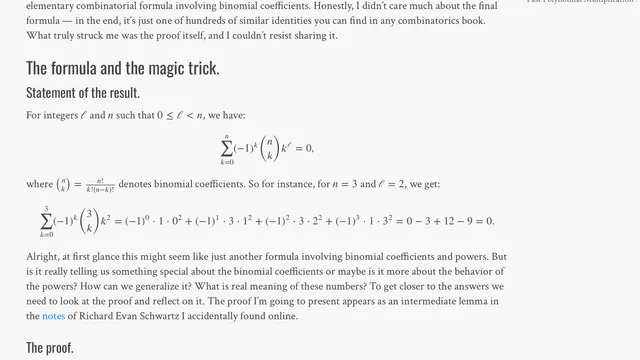In Mathematics Proofs Sometimes Matter More Than End Results
Audience: high-schoolundergraduategraduate
A short blog post illustrating mathematical thinking through proofs: starting with a simple combinatorial identity, we reflect on the proof and gradually generalize it step by step towards a q-analogue.
Analytics
Comments
This was a fun read! :)
I liked how the article walked us through the mathematical process and the motivations behind it. I did not know q-calculus prior to reading this, so I’m afraid I do not know if the generalisations found are classical results. The tone was also helped keep me engaged in reading it.
I would have liked it if in the definition of the q-exponential, some justification was given for why the infinite sum converges, but I understand that this was not really the goal of the post.
It appears your AI help gave you some jumps in logic and sentences without value. How does “To get closer to the answers we need to look at the proof and reflect on it.” help your explanation?
Good article, although I feel like it skips some details for brevity, but that makes it more difficult to understand for us mere mortals who don’t have a PhD in mathematics.
Why plug in q = e^x into the binomial theorem formula? The article doesn’t seem to provide a motivation for this choice.
I don’t really understand why the series expansion of (1 - e^x)^n starts from x^n. I wrote it down on paper to see that (1 - e^x)^n = (1 - 1 - x - x^2/2! - …)^n = (-x - x^2/2! - …)^n so evaluating this expression results in the first term being (-x)^n, not x^n, as far as I can tell. I may be wrong on that one though.
I also don’t understand why differentiating that expression l times makes it zero. I guess if you do that you get (-1)^n * (n^l) * x^(n-l), which would equal 0 if you plug in x = 0 I assume? I’m just guessing at this point. Maybe more explanation and examples would have been nice here. For the right hand side, it made more sense to me, since deriving e^x just gives e^x again, and e^0 = 1, so that checks out.
I found the section about Q-derivatives very fascinating though. I had never heard of them before, but the fact that taking the Q-derivative of e_q(z) equals e_q(z) again, just like deriving e^x equals e^x again, was kind of an aha-moment for me.
Additionally, I’m not sure what the vertical bar notation followed by a subscript means, e.g. |_z=0, I had to look that up myself to see it’s called an “evaluation bar”.
So yeah, conclusively, I think the article was good, although I may not have the required credentials to give a fully accurate rating.
BTW, I see the article has a “high-school” target audience, in addition to “undergraduate” and “graduate”, however the article seems far too advanced for high school IMHO.
Clear layout and easy to read, but there was no “aha” moment for me. It could be improved by including some motivation for why we care about the q-analogue.
This is interesting, and makes a good point about how the reasoning inside of proofs can contain hidden gems.
My main issue was that it was sometimes hard to follow, and assumes a fair amount of effort on the reader’s part to connect the dots. For example:
“we see that the series expansion of the left-hand side (1–ex)n starts from xn.”
Seems to require that you mentally substitute in the expansion of e^x into ( 1- e^x) to get -x - x^2/2!… Etc. And then imagine raising that infinite series to the power of n, and so the smallest power term is (-x)^n (and the negative is irrelevant to the argument). At least I think that’s what you’re supposed to understand; it was a number of steps, and maybe I misunderstood. But that’s my point.
It was an interesting post with an important take away. However, it was missing motivation in the argument.
A very well written blog with very natural generalisations, the technique described in the beginning is excellent and I will be trying to use it to prove all combinatorical identities involving terms similar to nCk * k^i.
